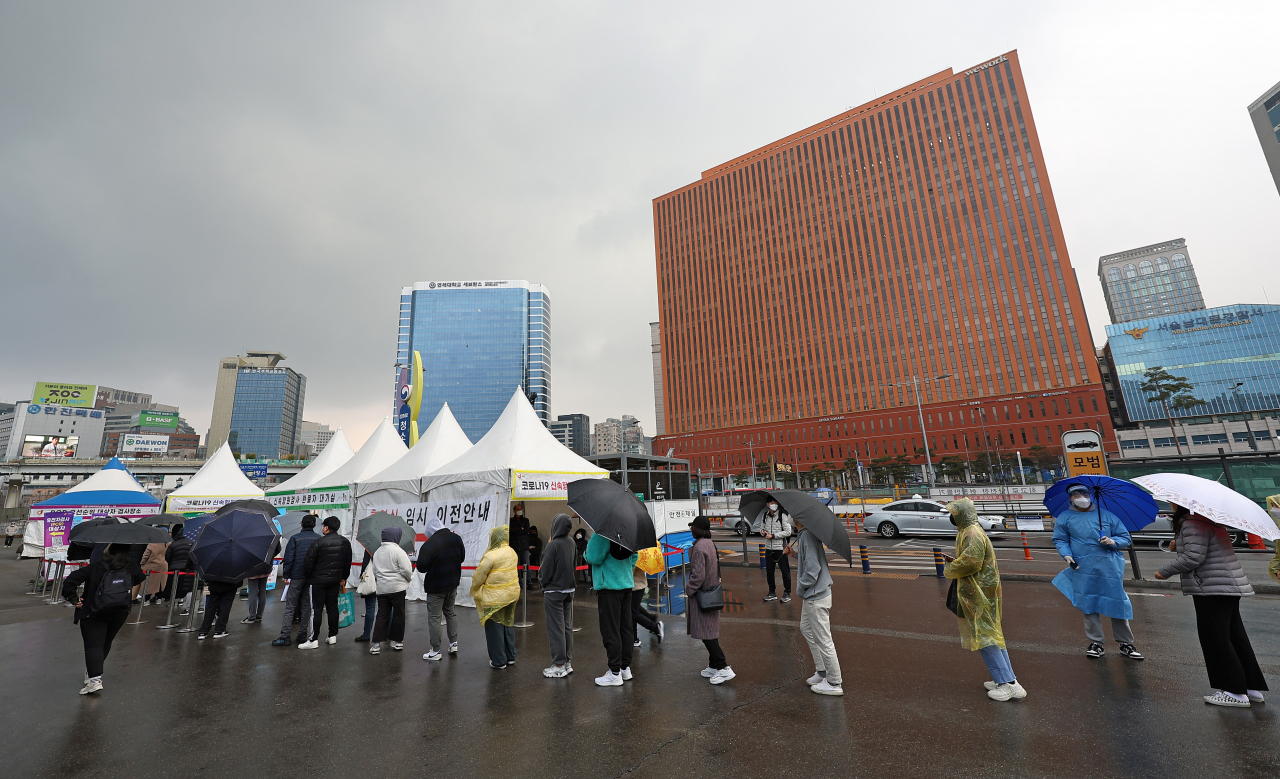 |
People wait in a long line to receive coronavirus tests at a makeshift COVID-19 testing facility in Seoul on Sunday. The country reported 334,708 new infections on the day. (Yonhap) |
South Korea's new COVID-19 cases dropped to the 200,000s for the first time in 10 days Monday due to less testing over the weekend, but concerns remain high that infections could spike again, as the government eased social distancing rules this week.
The country reported 209,169 new COVID-19 infections, raising the total caseload to 9,582,815, the Korea Disease Control and Prevention Agency (KDCA) said.
Monday's tally marked a sharp decline from a record high of 621,281 reported Thursday. The number of new daily cases usually shrinks at the beginning of the week due to less testing over the weekend.
The death toll from COVID-19 came to 12,757, up 329 from Sunday, the KDCA said. The fatality rate was 0.13 percent.
The number of critically ill patients stood at 1,030, up 97 from the previous day.
Despite recent letups, concerns lingered that daily infections could spike again, as the government eased social distancing rules as part of efforts to help small merchants and business owners taking the brunt of the pandemic due to less foot traffic and consumption.
Starting earlier in the day, the government eased the limit on private gatherings to eight people from the previous six while maintaining the 11 p.m. business curfew.
The measures are the latest in a series of steps to ease tough social distancing rules despite the still rampant spread of the highly transmissible omicron variant of the coronavirus.
In the face of the surging infections and overwhelmed hospital capacity, the government has also turned its focus away from preventing people from getting infected toward treating seriously ill patients.
It requires most infected people to receive at-home treatment for a week and allows them to go out without presenting their health status, such as polymerase chain reaction (PCR) test results.
Also, starting earlier in the day, fully-vaccinated international arrivals are required to submit their health status, such as PCR tests, and do not have to go through mandatory quarantine.
The number of people receiving at-home treatment stands at 1,993,986 as of Monday, the KDCA said.
Of the domestic cases, Seoul reported 41,078 new infections, with the surrounding Gyeonggi Province logging 56,909 The western port city of Incheon reported 12,086.
Those aged 60 or older, deemed to be a highly at-risk age group, accounted for 17.4 percent, the KDCA said.
As of midnight Sunday, 32.37 million people out of the 52 million population, or 63.1 percent, had received booster shots. Fully vaccinated people came to 44.46 million, representing 86.6 percent, the KDCA said. (Yonhap)







![[Today’s K-pop] Blackpink’s Jennie, Lisa invited to Coachella as solo acts](http://res.heraldm.com/phpwas/restmb_idxmake.php?idx=644&simg=/content/image/2024/11/21/20241121050099_0.jpg)
